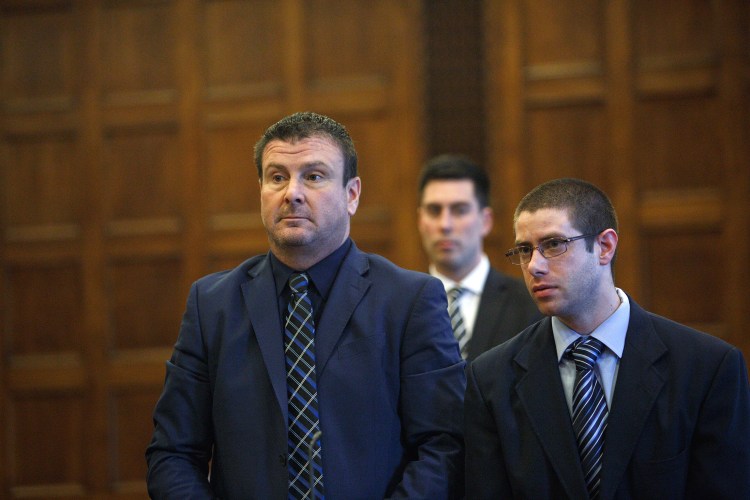A state forensic psychologist testified Monday that the man accused of killing a Somerset County Sheriff deputy last April could have plausibly believed police would beat or harm him if he did not cooperate with them, but she did not offer a determination as to whether he was telling the truth.

Cpl. Eugene Cole
Justice Robert Mullen, who is presiding over the case, also heard from the state police detective who led the investigation into the April 25, 2018, killing of Cpl. Eugene Cole, 62. The detective, Jason Andrews, said John Williams, 30, gave officers no reason to believe he feared them after he confessed in a taped interview to killing Cole.
Williams helped police by re-enacting his encounter with Cole and even thanked his interrogators for their fair treatment after they took him to jail, Andrews said.
But attorneys for Williams have asked Mullen to throw out the videotaped confession, arguing that arresting officers beat and kicked Williams while he was handcuffed and that he was hungry, tired, naked and experiencing opiate withdrawal when he was interviewed. The tactical team that arrested Williams handed him off to detectives, who interrogated him.
Cole was the first Maine police officer in nearly 30 years to be shot and killed in the line of duty. After the shooting, more than 200 police fanned out across central Maine looking for the suspect. Williams was captured after four days on the run.
Williams has pleaded not guilty and faces up to life in prison if convicted.
Williams did not take the stand during the hearing. Mullen could issue a ruling any time before jury selection for Williams’ trial begins in June.
Questions about Williams’ treatment in custody arose almost immediately after his capture. A photo taken immediately after he was arrested, in which a special agent for the Maine State Police is holding Williams’ head up to the camera as he lies face-down on the ground, was leaked on social media. A mugshot taken later showed Williams’ left eye was bruised and swollen and he had scratches on his body and face.
On the witness stand, Dr. Sarah Miller of the State Forensic Service said she evaluated Williams within the last several weeks and found that he reported feeling fearful of police during his interrogation in April 2018, and that he was also experiencing the effects of withdrawal from drugs – despite telling officers during the interview that he was not in pain or discomfort and appeared cooperative. Miller said Williams wanted to go along with the interview.
“I think he described it as not wanting to make waves,” said Miller, adding later that Williams told her he did not think anyone would care about his pain or discomfort.
Later, in response to more questions from Williams’ attorney, Miller said that while Williams could comprehend the Miranda warnings, he was not applying that information to his situation when making decisions. His perception of facing the threat of further beatings was a plausible clinical explanation, but she said other hypotheses should not be excluded.
“He said the Miranda warnings came in one ear and out the other, and so even though he heard them and understood them, he really wasn’t taking in that information and applying it to what that would actually mean,” Miller said. “(Williams) was smart enough to understand what they were saying to him, but he was not thinking about what that would mean for him long-term if he was to waive those rights.”
Deputy Attorney General Lisa Marchese, addressing Williams’ answers in the forensic interview, said that during his interview by state police, instead of complaining about his withdrawal symptoms, he told police he was experiencing the after-effects of adrenaline from the four-day chase and arrest.
Miller, in response to questions from Marchese, also said there were times in the interview that Williams appeared to go along with the leading questions of the interrogators, but he also stood firm on some of his answers. The interview was not confrontational, Miller said, and police fed him and gave him a blanket to cover himself after he started talking, but he did not stop cooperating once he received the food and drinks.
“It’s also reasonable to believe that if (receiving food and drinks) was the only reason he was talking, he would have stopped talking a lot earlier?” Marchese asked.
“Yes,” Miller replied.
Marchese also questioned state police Detective Andrews, who drove Williams from the site of his capture to the police station for questioning and then participated in his interrogation as the lead detective. During the time he spent with Williams, Andrews said, not once did Williams show signs that he feared Andrews or his partner; neither did police ever threaten to withhold food or water if he refused to answer questions, Andrews said. Andrews said he read Miranda warnings to Williams twice: once before the interview began, and once again before Williams helped detectives re-enact the murder.
Andrews said Williams even thanked him for the kind treatment after the questioning was over.
But Williams’ attorney, Verne E. Paradie, seized on a series of exchanges in which Andrews pushed Williams to reveal more of the version of events that Andrews believed to be true, quashing Williams’ attempts to suggest a self-defense scenario when he shot Cole.
“There are a number of occasions where he tries to tell you one thing, you’re not buying it, and then he changes his story, right?” Paradie asked.
“Yes,” Andrews replied.
_______________________________
CORRECTION: This story was updated at 7:30 p.m. on April 9, 2019, to correct the agency affiliation of the officer who held John Williams’ head for a photo taken immediately after his arrest.
Comments are not available on this story.
Send questions/comments to the editors.



